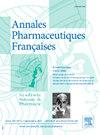Pharmacovigilance européenne des médicaments de thérapie innovante
IF 1.1
Q4 PHARMACOLOGY & PHARMACY
引用次数: 0
Abstract
Les médicaments de thérapie innovante (MTI) prennent une place progressivement croissante en thérapeutique et représentent, parfois, le seul espoir d’amélioration, voire de guérison, de certaines pathologies. Leur origine biologique, leur composition, leur mode d’action et leur fréquente complexité technique sont générateurs de nouveaux risques. Par ailleurs, les essais cliniques ne portent généralement que sur un très faible nombre de patients. La pharmacovigilance des MTI doit s’adapter à ces contraintes et à ces nouveaux risques identifiés ou potentiels pour être autorisés en Europe selon une procédure centralisée. La conception et l’analyse du plan de gestion des risques sont essentielles pour permettre, en complément de la pharmacovigilance dite « de routine », de continuer l’évaluation de la sécurité du MTI en conditions réelles et d’adapter les mesures de surveillance si besoin. Cet article fait un état des lieux des MTI et des spécificités réglementaires en matière de pharmacovigilance, en détaillant le rôle des comités européens dont le Committee for Advanced Therapies, l’importance du plan de gestion des risques et en abordant la problématique des effets indésirables retardés. La pharmacovigilance des MTI préparés ponctuellement (MTI-PP), dans le cadre de l’exemption hospitalière, est également décrite en prenant l’exemple de MTI-PP d’immunothérapie adoptive.
Advanced therapy medicinal products (ATMPs) are playing an increasingly important role in therapeutics, and sometimes represent the only hope of improving or even curing some pathologies. Because of their biological origin, composition, mode of action, and their frequent technical complexity, ATMPs are potentially generating new risks. Moreover, clinical trial data generally concern only a very small number of patients. The pharmacovigilance of ATMPs must adapt to these constraints and to these new identified or potential risks to be authorized according to an European centralized procedure. The conception and the assessment of the Risk Management Plan are essential to complete routine pharmacovigilance with post-authorization studies and additional risk minimisation measures adapted to the identified safety concerns. This article provides an overview of existing ATMPs and their specific regulatory pharmacovigilance requirements, involving the role of the European committees. It aims to describe the essential elements of the risk management plan of ATMPS, with a focus on delayed adverse reactions. The particular case of ATMPs prepared in the context of « hospital exemption », is also addressed, with the example of ATMPs for adoptive immunotherapy.
[欧洲先进治疗药品药物警戒]。
先进治疗药物(ATMP)在治疗中发挥着越来越重要的作用,有时甚至是改善甚至治愈某些病症的唯一希望。由于其生物来源、成分、作用方式以及经常出现的技术复杂性,ATMP 可能会产生新的风险。此外,临床试验数据通常只涉及极少数患者。ATMP 的药物警戒必须适应这些制约因素,并适应这些新发现的或潜在的风险,以便根据欧洲的集中程序获得授权。风险管理计划的构思和评估对于完成常规药物警戒、授权后研究以及根据已确定的安全问题采取额外的风险最小化措施至关重要。本文概述了现有的 ATMP 及其特定的药物警戒监管要求,其中涉及欧洲委员会的作用。文章旨在描述 ATMP 风险管理计划的基本要素,重点关注延迟不良反应。此外,还以用于采纳性免疫疗法的 ATMP 为例,介绍了在 "医院豁免 "背景下制备的 ATMP 的特殊情况。
本文章由计算机程序翻译,如有差异,请以英文原文为准。
求助全文
约1分钟内获得全文
求助全文
来源期刊

Annales pharmaceutiques francaises
PHARMACOLOGY & PHARMACY-
CiteScore
1.70
自引率
7.70%
发文量
98
期刊介绍:
This journal proposes a scientific information validated and indexed to be informed about the last research works in all the domains interesting the pharmacy. The original works, general reviews, the focusing, the brief notes, subjected by the best academics and the professionals, propose a synthetic approach of the last progress accomplished in the concerned sectors. The thematic Sessions and the – life of the Academy – resume the communications which, presented in front of the national Academy of pharmacy, are in the heart of the current events.
 求助内容:
求助内容: 应助结果提醒方式:
应助结果提醒方式:


